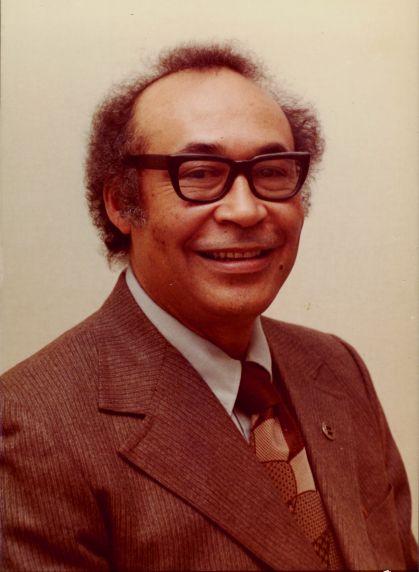Dr. Cornelius Golightly - philosopher and champion of education
The Reuther Library has several recognizable and notable members of the community within its stacks. One such figure, Dr. Cornelius Golightly, happens to be a well-known philosopher and trailblazing African American educator. Cornelius Lacy Golightly, one of ten children in the Golightly household, was born on May 23, 1917, in Waterford, Mississippi. Cornelius is the grandson of former slaves and from his early days, the son of Reverend Richmond Mack and Margaret Fullilove Golightly was regularly exposed to incidents of racial segregation and discrimination that helped fuel his future passion for activism. At 17, Cornelius enrolled at Talladega College in Alabama, where he excelled in athletics and academics alike. He participated in the "Intellectual Olympics" and was one of only five black students from across the United States to earn honors in the 1938 competition.
After graduating from Talladega in 1938, Cornelius went on to study Philosophy at the University of Michigan, where he completed his doctoral work in just three years, earning his M.A. in 1939 and this Ph.D. in 1941. Dr. Golightly began post-doctoral work as a Rosenwald Fellow at Harvard University in 1941 and was hired as an instructor for Howard University in 1942. In 1943, Dr. Golightly became a Compliance Analyst for the federal government with the Fair Employment Practices Committee (FEPC) until the end of World War II.
It wasn't until the end of the war that Dr. Golightly was able to return to his academic roots, when he was hired as an academic philosopher at Olivet College. However, when academic freedom for the faculty became too restricted, in part due to the Cold War, Golightly resigned from his position. He was quickly hired by the Philosophy department at the University of Wisconsin at Madison, remaining there until 1955. He joined the faculty of the University of Wisconsin at Milwaukee and worked until 1969.
From Wisconsin, Dr. Golightly was appointed Associate Dean of Wayne State University's Philosophy Department, where he also served as a Professor, making him the first African American to teach in the philosophy department at WSU. Golightly's passion for public education drove him to continue the work he'd begun in Wisconsin, and he was elected the first African American President of the Detroit School Board in 1973. He would remain President until 1976, when, unfortunately, Dr. Golightly passed away from a brain hemorrhage. The Detroit Public School administration honored Dr. Golightly by establishing the Golightly Career and Technical Center in 1982.
The Cornelius Golightly Papers contain many records that paint a bright picture of a fascinating man. Dr. Golightly was a highly decorated individual, and his awards and certificates fill a portion of the collection, as well as several pieces of publications that brought about the attention his research needed. Dr. Golightly was also a member of several boards of education, as well as a professor in several institutions. Fortunately, the Reuther has a large collection of materials that reflect his time as a leading figure in many of his roles. Dr. Golightly's involvement in the Detroit community also creates a major relationship to several other collections found within the Reuther, such as the Coleman Young Papers, the Department of Africana Studies Records, and the Detroit Board of Education Public Schools Records.
Golightly had an extensive research background in integration and what is known as "De Facto Segregation" in public schools in northern cities, such as Detroit and Milwaukee. This, along with Golightly's background in the federal government, gave him the tools to work on integration policies and race relations during his time with the public-school boards. His activism in academia and in the public sphere brought greater attention to inequalities in the education system and promoted social justice to a higher standard.
This blog post was contributed by Mark Prindiville, Archives Technician at the Reuther Library


 Reddit
Reddit Facebook
Facebook LinkedIn
LinkedIn